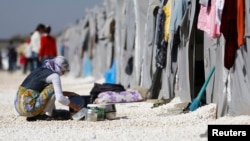The U.N. refugee agency warns it will have to cut winter aid for nearly one million displaced Iraqis and Syrians because of a severe funding shortage. The UNHCR says it will have to make some very difficult choices over who will receive aid this winter and who will not.
The U.N. refugee agency warns of very tough times ahead for hundreds of thousands of people in conflict-ridden Syria and Iraq. Because of a funding shortfall of more than $58 million, the UNHCR says it will have to concentrate its efforts on helping the most vulnerable survive the harsh winter.
The vicious onslaught of the Islamic State militant group in Iraq has forced 1.9 million people to flee for their lives. These people are bereft of homes, comfort, of any belongings that could make their lives bearable during the coming months.
Massive needs, insufficient funding
UNHCR spokeswoman Melissa Fleming says the needs in Iraq are massive, but funding is not keeping pace with the new displacement. She says between 300 and 500 refugees are arriving daily in northern Iraq from the Kobani region of Syria.
She says about 800,000 internally displaced people in Iraq’s Kurdistan region are in desperate need of shelter and other assistance. She says the UNHCR had planned to assist 600,000 people, but will only be able to help 240,000 displaced Iraqis with winter aid.
She says the situation is equally grim in Syria.
“New displacement and multiple displacement inside Syria with people having to flee more than several times inside the country in terms of safety has also fueled an increase in winter aid because people are fleeing without anything to protect them," she said. "We were planning to help 1.4 million people with winter in the country. But, unfortunately, we only have enough funds to provide kits for 620,000 people through December - and then we have to look to January and February, which are very cold months.”
13.6 million people displaced
The UNHCR has added up the total number of Syrian and Iraqi refugees and internally displaced people and has come up with a staggering total of 13.6 million people who are displaced because of conflict and violence in these countries.
The director of UNHCR’s Middle East and North Africa Bureau, Amin Awad, has just returned from Iraqi Kurdistan and he warns that people there will have great difficulty coping with the freezing temperatures.
He says he wishes the UNHCR could help everyone, but it can not, so it has to prioritize. This, he says will include assisting people who are in the coldest high-elevation areas of Irbil, Dohuk, and northern Syria. He says his agency will have to help those living in the open in collective centers, and in tents and camps.
“The most vulnerable population that I am really concerned for are the newly born babies who could face hypothermia and freezing as we have seen in Syria last year," he said. "The elderly and the frail, the sick and also, you have to understand that in winter there is a high increase of sickness, especially upper respiratory problems among children, elderly, and even the young and the strong population.”
The winterization program in Iraq and Syria is part of an inter-agency effort. The UNHCR concentrates on providing shelter and a variety of non-food items to the refugees and displaced.
It is focusing on relief items such as thermal blankets, winter clothing, and extra plastic sheeting. It also is working to reinforce collective and private shelters, currently housing thousands of displaced families.




